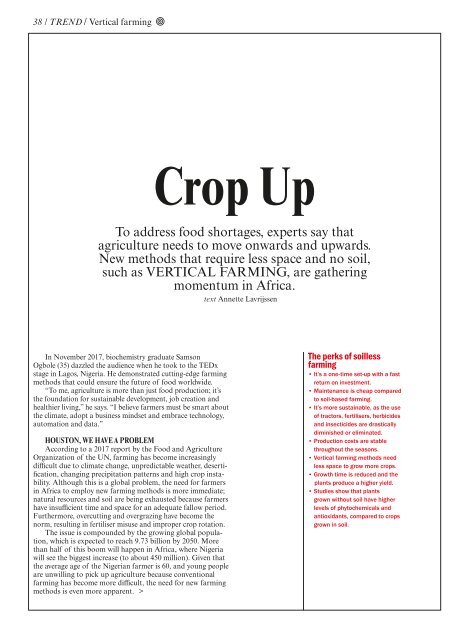january-2019
January Issue
January Issue
Create successful ePaper yourself
Turn your PDF publications into a flip-book with our unique Google optimized e-Paper software.
38 / TREND / Vertical farming<br />
TREND / 39<br />
Crop Up<br />
“The hydroponic system<br />
supports the growing of<br />
all leafy vegetables”<br />
To address food shortages, experts say that<br />
agriculture needs to move onwards and upwards.<br />
New methods that require less space and no soil,<br />
such as VERTICAL FARMING, are gathering<br />
momentum in Africa.<br />
text Annette Lavrijssen<br />
In November 2017, biochemistry graduate Samson<br />
Ogbole (35) dazzled the audience when he took to the TEDx<br />
stage in Lagos, Nigeria. He demonstrated cutting-edge farming<br />
methods that could ensure the future of food worldwide.<br />
“To me, agriculture is more than just food production; it’s<br />
the foundation for sustainable development, job creation and<br />
healthier living,” he says. “I believe farmers must be smart about<br />
the climate, adopt a business mindset and embrace technology,<br />
automation and data.”<br />
HOUSTON, WE HAVE A PROBLEM<br />
According to a 2017 report by the Food and Agriculture<br />
Organization of the UN, farming has become increasingly<br />
difficult due to climate change, unpredictable weather, desertification,<br />
changing precipitation patterns and high crop instability.<br />
Although this is a global problem, the need for farmers<br />
in Africa to employ new farming methods is more immediate;<br />
natural resources and soil are being exhausted because farmers<br />
have insufficient time and space for an adequate fallow period.<br />
Furthermore, overcutting and overgrazing have become the<br />
norm, resulting in fertiliser misuse and improper crop rotation.<br />
The issue is compounded by the growing global population,<br />
which is expected to reach 9.73 billion by 2050. More<br />
than half of this boom will happen in Africa, where Nigeria<br />
will see the biggest increase (to about 450 million). Given that<br />
the average age of the Nigerian farmer is 60, and young people<br />
are unwilling to pick up agriculture because conventional<br />
farming has become more difficult, the need for new farming<br />
methods is even more apparent. ><br />
The perks of soilless<br />
farming<br />
• It’s a one-time set-up with a fast<br />
return on investment.<br />
• Maintenance is cheap compared<br />
to soil-based farming.<br />
• It’s more sustainable, as the use<br />
of tractors, fertilisers, herbicides<br />
and insecticides are drastically<br />
diminished or eliminated.<br />
• Production costs are stable<br />
throughout the seasons.<br />
• Vertical farming methods need<br />
less space to grow more crops.<br />
• Growth time is reduced and the<br />
plants produce a higher yield.<br />
• Studies show that plants<br />
grown without soil have higher<br />
levels of phytochemicals and<br />
antioxidants, compared to crops<br />
grown in soil.<br />
Getty Images
















